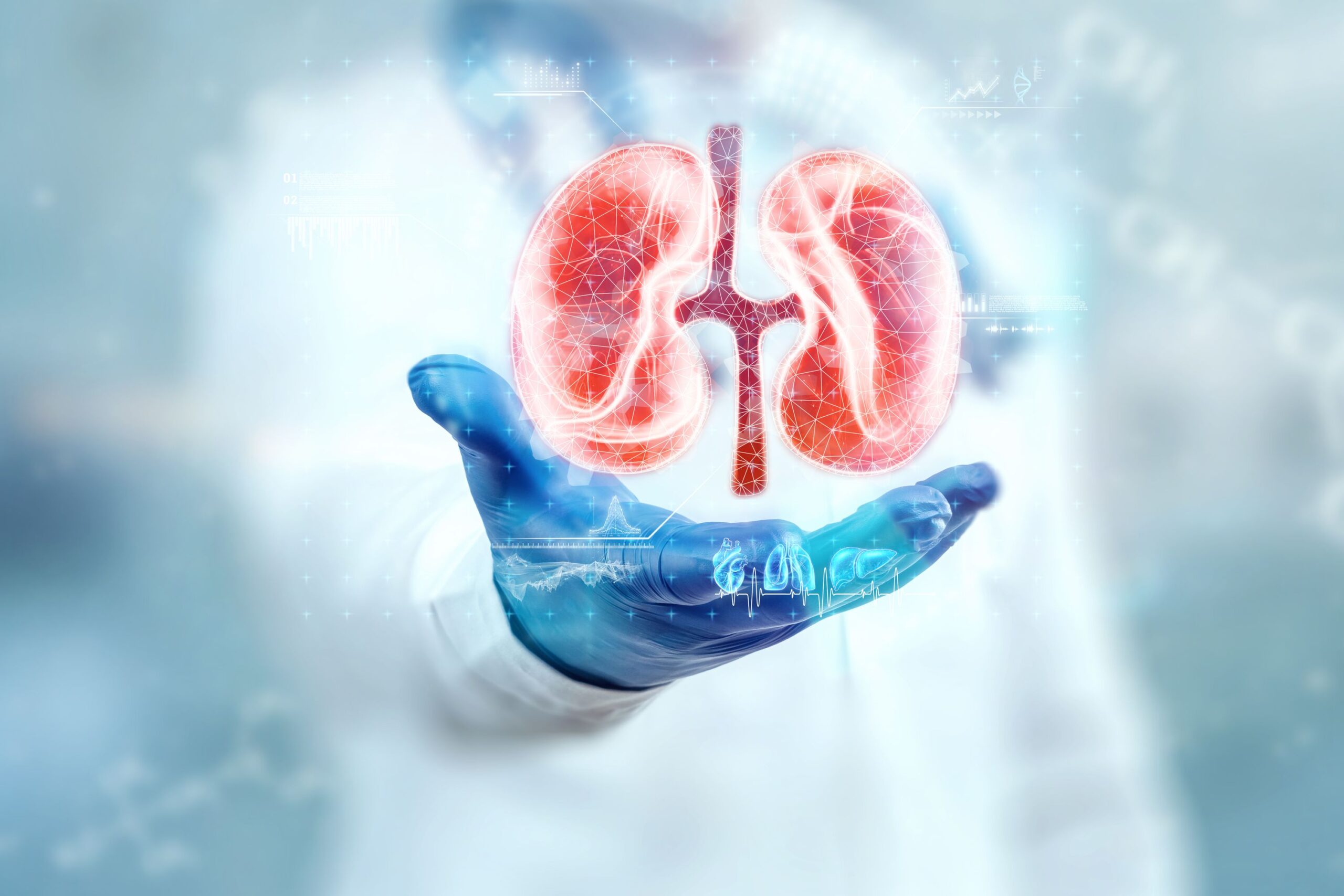
Nephrology is the branch of medicine that deals with diseases of the kidneys and bladder. In addition to the filtration function, the kidneys play a secretory role (erythropoietin is involved in the production of red blood cells, the active form of vitamin D3 is necessary for proper bone mineralization), regulate water-electrolyte and acid-base balance, and play an important role in maintaining normal blood pressure.
FLOSMED offers you a nephrological consultation at Katarzyna Smykał-Jankowiak, MD, PhD.

Katarzyna Smykał-Jankowiak, MD, PhD
Katarzyna Smykał-Jankowiak is a graduate of the Medical University of Karol Marcinkowski in Poznań, which she graduated in 2007. with an excellent rating in 2012. received the title of doctor of medical sciences on the basis of a doctoral dissertation entitled "Analysis of the occurrence of antibodies against complement C1q in the serum of patients with primary and secondary glomerulonephritis". She is a co-author of several scientific publications and several reports presented at national and international conferences (including, among others, a presentation awarded during the XX Polish-German-Czech Symposium "Modern Aspects of Nephrology and Hypertension" in 2014). in 2015 she obtained the title of specialist in internal medicine with a very good grade. Then she specialized in nephrology at the Department and Clinic of Nephrology, Transplantology and Internal Diseases of the Teaching Hospital. H. Święcicki in Poznań. Currently, she has started specialization in the field of transplantology at the Department of Transplantology and General Surgery with the Urology Subdepartment at the Provincial Hospital in Poznań.
He is a member of the Polish Society of Nephrology and Transplantology, the Polish Club of Vascular Access and the European Renal Association - European Dialysis and Transplant Association (ERA-EDTA).
Scope of diagnostics and tests:
a) kidney diseases, the symptoms of which may be:
- proteinuria
- erythrocyturia (increased number of red blood cells in the urine)
- hypertension
- swelling
- electrolyte disturbances: abnormal concentrations of sodium, potassium, calcium, phosphates;
- acidosis
- anemia
b) glomerulonephritis - primary as well as in the course of systemic lupus erythematosus or systemic vasculitis
c) kidney damage in the course of hypertension, diabetes, heart failure
d) acute and chronic renal failure (increased serum creatinine and reduced renal filtration function)
e) urinary tract infections
f) kidney stones
g) internal medicine advice
Specializations:
Nephrology
Internal diseases, Transplantology
Price list
Consultation
PLN 250Teleconsultation
PLN 200Consultation with ultrasound assessment (USG)
PLN 250
Contact
Address
- st. Barwicka 14A, 60-192 Poznań
Contact number
Email for booking
Work hours
- Mon. - Fri: 10 - 20, Sat: 10 - 14
What does a kidney ultrasound look like?
Kidney ultrasound (USG) is a non-invasive diagnostic procedure that uses sound waves to generate images of the internal structure of the kidneys. During the examination, the patient lies on his back or side and the doctor applies ultrasound gel to the patient's skin, which helps transmit sound waves. Using a hand-held device called a transducer, the doctor moves it across the skin in the kidney area, which allows images of the kidneys to be viewed on a monitor screen in real time. The test usually takes about 20-30 minutes and does not require any special preparation, although patients may be asked to fill their bladder to facilitate observation.
Is kidney ultrasound painful?
Renal ultrasound is generally considered painless and does not cause any discomfort. The sound waves used in ultrasound are completely harmless and imperceptible to the patient. The only potential source of discomfort may be the need to keep the bladder full before the examination, which is sometimes required for better visualization of the kidneys and adjacent structures. Additionally, the pressure of the transducer on the skin, while usually gentle, can be somewhat uncomfortable, especially in sensitive areas or in patients with existing skin conditions. However, any unpleasant sensations are minimal and should not cause you to worry before taking the test.
Diseases diagnosed using kidney ultrasound
Renal ultrasound allows the identification of a wide spectrum of diseases and pathological conditions. The most common include:
Kidney stones: Ultrasound is an effective tool in detecting kidney stones, enabling the assessment of their size, location and potential impact on kidney function.
Kidney cysts: This procedure identifies renal cysts, which can be benign or indicate more serious conditions.
Kidney infections and inflammation: Ultrasound can detect signs of infection and inflammation of the kidneys, such as nephritis or glomerulonephritis.
Kidney cancer: Although ultrasound is not the primary diagnostic tool for detecting kidney tumors, it can help identify suspicious masses that require further investigation.
Structural disorders and congenital kidney defects: This test enables the detection of abnormalities in the structure of the kidneys, which may be congenital or acquired.
Blood flow assessment: Doppler ultrasound allows the assessment of blood flow in the kidneys, which is important in diagnosing diseases such as narrowing of the renal arteries.
Kidney ultrasound is therefore a comprehensive diagnostic tool that can provide valuable information about kidney health.
Nephrology – a modern approach to the diagnosis and treatment of chronic kidney disease
Nephrology, as a key field of medicine, focuses on the diagnosis and treatment of kidney diseases. In recent decades, thanks to technological and medical progress, nephrology has gained new diagnostic and therapeutic tools, significantly improving the care of patients with chronic kidney disease (CKD). Statistics show that CKD is a global health problem, with an increasing number of patients requiring comprehensive nephrology care.
Chronic kidney disease, defined by nephrologists as the gradual deterioration of kidney function, affects millions of people around the world, including a significant number of the population in Poland. It is characterized by a drop in glomerular filtration below a certain threshold, which leads to the accumulation of toxins and may lead to kidney failure. The challenge for nephrology is not only the treatment of advanced stages of CKD, but also early diagnosis and intervention aimed at delaying the progression of the disease.
In the field of nephrology, advances in the diagnosis of chronic kidney disease are opening up new opportunities. In addition to traditional methods such as blood creatinine testing and urinalysis, advanced techniques including molecular biomarkers and medical imaging are playing an increasingly important role. These modern tools allow nephrologists to more precisely assess kidney function and early detection of pathological changes, which is crucial for the effective treatment of CKD. The use of, for example, magnetic resonance imaging and advanced genetic tests contributes to a better understanding of disease mechanisms and individualization of therapy.
Nephrology is constantly evolving, introducing innovative methods of treating chronic kidney disease. From drug therapy to control blood pressure and blood sugar levels to new drugs targeting specific pathological pathways in the kidney, therapeutic options are becoming more advanced. Nephrologists are also increasingly using treatment methods based on modifying the patient's diet and lifestyle, which has a significant impact on slowing down the progression of CKD and improving the quality of life of patients.
Despite progress, nephrology faces many challenges, including ensuring equitable access to care and treatment. At the same time, the development of technologies such as regenerative therapy and personalized medicine opens new perspectives in the treatment of CKD. The future of nephrology may bring a better understanding of kidney diseases at the molecular level and an even more personalized approach to treatment.
Specialty clinics like ours play a key role in the treatment of chronic kidney disease. Thanks to a multidisciplinary approach combining the expertise of nephrologists with the latest diagnostic and therapeutic technologies, these clinics provide comprehensive care for patients with CKD.
Nephrology, thanks to continuous progress in diagnosis and treatment, contributes to significant improvement in the care of patients with chronic kidney disease. Innovations in this field not only improve the quality of life of patients, but also open up new therapeutic possibilities, changing the future of CKD treatment.
All about Nephrology and its Contemporary Challenges
Nephrology is a field of medicine that deals with the diagnosis and treatment of kidney diseases. The kidneys are key organs in the human body, responsible for filtering blood, removing waste, regulating electrolyte balance and blood pressure, as well as producing hormones. Kidney disease can have serious consequences on your overall health, leading to chronic kidney disease (CKD) or acute kidney failure.
In recent years, advances in nephrology focused on better understanding the mechanisms of kidney diseases, developing new diagnostic and therapeutic methods, as well as improving the quality of life of patients with kidney diseases. However, despite these advances, nephrology still faces many challenges.
One of the main challenges is early diagnosis and intervention. Many kidney diseases develop without obvious symptoms, which often leads to late diagnosis and difficulties in treatment. Therefore, it is important that primary care physicians are aware of potential early signs of kidney disease and refer patients to specialists appropriately.
Another significant challenge is the management of chronic kidney disease (CKD). CKD is a long-term condition that requires ongoing monitoring and treatment to slow the progression of the disease and prevent complications. This includes dietary management, drug treatment and, in more advanced cases, dialysis or kidney transplantation.
Patient education presents another challenge. Patients with kidney disease need to understand their disease and learn how to best manage their condition, which includes lifestyle changes, following a treatment plan, and having regular check-ups.
Finally, technological advances and scientific research are crucial to the development of nephrology. Innovations in diagnostics, such as advanced imaging techniques and biomarkers, are opening up new opportunities for the early detection and treatment of kidney disease. At the same time, ongoing research on new therapies and drugs aims to improve treatment outcomes and quality of life for patients.
Assessment and Management of Chronic Kidney Disease (CKD)
Chronic kidney disease (CKD) is a serious health problem that affects millions of people around the world. CKD is characterized by a gradual deterioration of kidney function, which can lead to kidney failure and the need for dialysis or transplantation. Managing CKD requires a comprehensive approach that includes regular assessment of kidney function, risk factor management, and appropriate therapeutic interventions.
Assessment of kidney function is a key element of CKD management. The two main metrics are estimated glomerular filtration rate (eGFR) and albuminuria level. eGFR is a measure of the kidney's filtration efficiency, and albuminuria indicates the presence of protein in the urine, which is a marker of kidney damage.
A study published in 2022 titled "Albuminuria testing and nephrology care among insured US adults with chronic kidney disease: a missed opportunity" (Source), highlights the importance of these indicators in the management of CKD. The study authors noted that many patients with CKD do not receive appropriate nephrological care, despite meeting the criteria for referral to a specialist. This is due, in part, to the underutilization of albuminuria testing in clinical practice.
Management of CKD involves a range of interventions, including dietary modifications, blood pressure control, diabetes management (if present), and the use of medications that can slow the progression of the disease. It is also important to regularly monitor the patient's health and adjust the treatment plan as the condition changes.
Patient education plays a key role in CKD management. Patients should be aware of the importance of regular examinations, following dietary and medication recommendations, and understanding the potential consequences and complications of CKD.
Training and Competencies in Ultrasound (POCUS) in Nephrology
Point of care ultrasound (POCUS) is a dynamically developing field that is gaining in importance in nephrology. POCUS enables doctors to perform rapid and non-invasive ultrasound examinations right at the patient's bedside, which can significantly improve the quality of care for patients with kidney disease.
A 2022 article titled “Point-of-Care Ultrasound Training during Nephrology Fellowship” (Source), emphasizes the importance of POCUS training for nephrologists. This study showed that only a small proportion of nephrologists receive POCUS education during their specialization, and even fewer feel competent to use this technique on their own.
Application of POCUS in nephrology includes a number of procedures, such as assessing access to dialysis, kidney biopsy and diagnostics to assess hydration status and detect CKD complications. POCUS training can significantly improve the diagnostic skills of nephrologists, which translates into better patient care.
However, there are challenges in implementing POCUS training programs, including a lack of sufficient qualified instructors and limited resources. Nevertheless, the growing interest and demand for POCUS training among nephrologists indicates the need for the development and integration of such programs as part of specialist training.
Development of Training Programs in Nephrology
The development of training programs in nephrology is crucial to ensuring high-quality care for patients with kidney diseases. In particular, training in POCUS is becoming increasingly important, as shown in this 2022 article: “Incorporating Training in POCUS in Nephrology Fellowship Curriculum” (Source). This article highlights the need to incorporate POCUS training into nephrologist educational programs.
Challenges and Opportunities
challenges: The main challenges are lack of training standards, limited resources and the need for qualified instructors.
Capabilities: The development of POCUS programs offers an opportunity to improve the diagnostic skills of nephrologists, which may contribute to better assessment and treatment of patients with kidney disease.
Importance of POCUS Training
POCUS training enables nephrologists to more accurately assess a patient's condition, which is particularly important in emergency cases and in the management of chronic kidney disease.
Integrating POCUS into training programs may also advance research in the field of nephrology, enabling a better understanding of kidney diseases and their treatment.
Future Directions
- Development and standardization of POCUS training programs.
- Supporting research on the effectiveness and impact of POCUS training on clinical practice in nephrology.
In this article, we discussed key aspects of nephrology, including the challenges in diagnosing and managing CKD, the importance of POCUS training, and the development of training programs. Nephrology as a medical field continues to evolve, and advances in research and technology are opening new opportunities to better understand and treat kidney disease.
Future directions in nephrology include further development of diagnostic methods such as POCUS, better CKD management strategies, as well as increased research into new therapies. The education and training of specialists in nephrology will be crucial to ensuring high-quality patient care and to the further development of this important field of medicine.
REFERENCES
“Albuminuria testing and nephrology care among insured US adults with chronic kidney disease: a missed opportunity” (Source).
“Point-of-Care Ultrasound Training during Nephrology Fellowship” (Source).
“Incorporating Training in POCUS in Nephrology Fellowship Curriculum” (Source).
